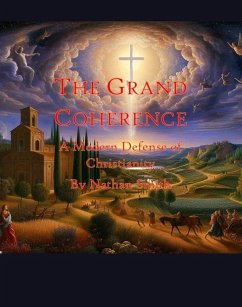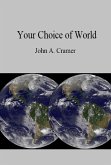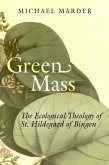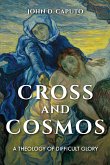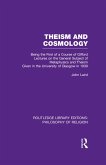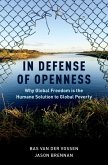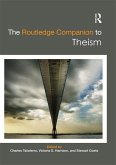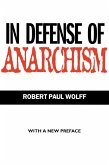A sweeping apologetic work, The Grand Coherence starts from first philosophy, wrestling with the question of answering the skeptic and how to decide what to believe. A preliminary answer to that is based on Bayes' Law and convergence of belief in the face of accumulating evidence. But that is thrown into confusion by the resurrection of Christ, a unique case where one of two extremely improbable beliefs, a man rising from the dead or a spontaneous, motiveless, highly successful hoax, must be true. The challenge of the resurrection compels us to probe deeply into the origins of worldviews. While Bayesian processing of evidence combined with critical reasoning in pursuit of consistency can do much, ultimately it takes a dash of Platonism, of trust in the reality of ideas, to avoid falling into skepticism.
Science, the accumulation of knowledge about physical nature through hypothesis testing, has accomplished so much that some are tempted to think it describes everything that there is. Yet physics now requires not only a causer for the Big Bang, but an explanation of the fine tuning of natural laws to make it suitable for life, questions to which God is the only sensible answer. And despite the dogmatism of biologists, life probably has far too much complexity to be explicable by mere chance-based evolution. Scientific materialism falls, above all, to the argment from reason, for if physicalist explanations of the mind are accepted, reason becomes untrustworthy, which in turn pulls the rug out from under scientific materialism. It turns out, moreover, that the scientific natural history of today fits strikingly well with Genesis 1 (the "days" are periods of time, not 24 hours), and that Darwinian sociobiology combined with the Golden Rule supplies a comprehensive warrant for traditional Christian sexual ethics.
With certain errors out of the way, a searching look at life experience and the natures of things leads to the conviction that the world is intensely good, but also vitiated, suffering, disintegrating. This is pre-Christianity, the commonsense theology of creation and fall, yet it is too strange to be believed. Why would the good Maker of this good universe let it run down and unravel like that? So it's rational to be on the lookout for something different, for God to make His move to rescue the world, and mankind has believed in all sorts of wild rumors and superstitions in the hope of that. But one of the rumors turns out, on investigation, to be true. Jesus Christ, the one perfect man who ever lived, rose from the dead. And he left behind the Church, enduring through the ages, in supernatural superiority to all the laws of history. We want to be redeemed somehow, rescued from the death and disintegration to which we are fated by the laws of this world, and God has promised to rescue us, though His plans for doing so seem mad. And yet in the incomprehensible miracle that God became a man, lived and taught and suffered as a man, lies the key to hope.
In a nutshell, the argument updates the philosophy of CS Lewis to incorporate scientific and philosophical discoveries since his death.
Science, the accumulation of knowledge about physical nature through hypothesis testing, has accomplished so much that some are tempted to think it describes everything that there is. Yet physics now requires not only a causer for the Big Bang, but an explanation of the fine tuning of natural laws to make it suitable for life, questions to which God is the only sensible answer. And despite the dogmatism of biologists, life probably has far too much complexity to be explicable by mere chance-based evolution. Scientific materialism falls, above all, to the argment from reason, for if physicalist explanations of the mind are accepted, reason becomes untrustworthy, which in turn pulls the rug out from under scientific materialism. It turns out, moreover, that the scientific natural history of today fits strikingly well with Genesis 1 (the "days" are periods of time, not 24 hours), and that Darwinian sociobiology combined with the Golden Rule supplies a comprehensive warrant for traditional Christian sexual ethics.
With certain errors out of the way, a searching look at life experience and the natures of things leads to the conviction that the world is intensely good, but also vitiated, suffering, disintegrating. This is pre-Christianity, the commonsense theology of creation and fall, yet it is too strange to be believed. Why would the good Maker of this good universe let it run down and unravel like that? So it's rational to be on the lookout for something different, for God to make His move to rescue the world, and mankind has believed in all sorts of wild rumors and superstitions in the hope of that. But one of the rumors turns out, on investigation, to be true. Jesus Christ, the one perfect man who ever lived, rose from the dead. And he left behind the Church, enduring through the ages, in supernatural superiority to all the laws of history. We want to be redeemed somehow, rescued from the death and disintegration to which we are fated by the laws of this world, and God has promised to rescue us, though His plans for doing so seem mad. And yet in the incomprehensible miracle that God became a man, lived and taught and suffered as a man, lies the key to hope.
In a nutshell, the argument updates the philosophy of CS Lewis to incorporate scientific and philosophical discoveries since his death.
Dieser Download kann aus rechtlichen Gründen nur mit Rechnungsadresse in A, B, CY, CZ, D, DK, EW, E, FIN, F, GR, H, IRL, I, LT, L, LR, M, NL, PL, P, R, S, SLO, SK ausgeliefert werden.

